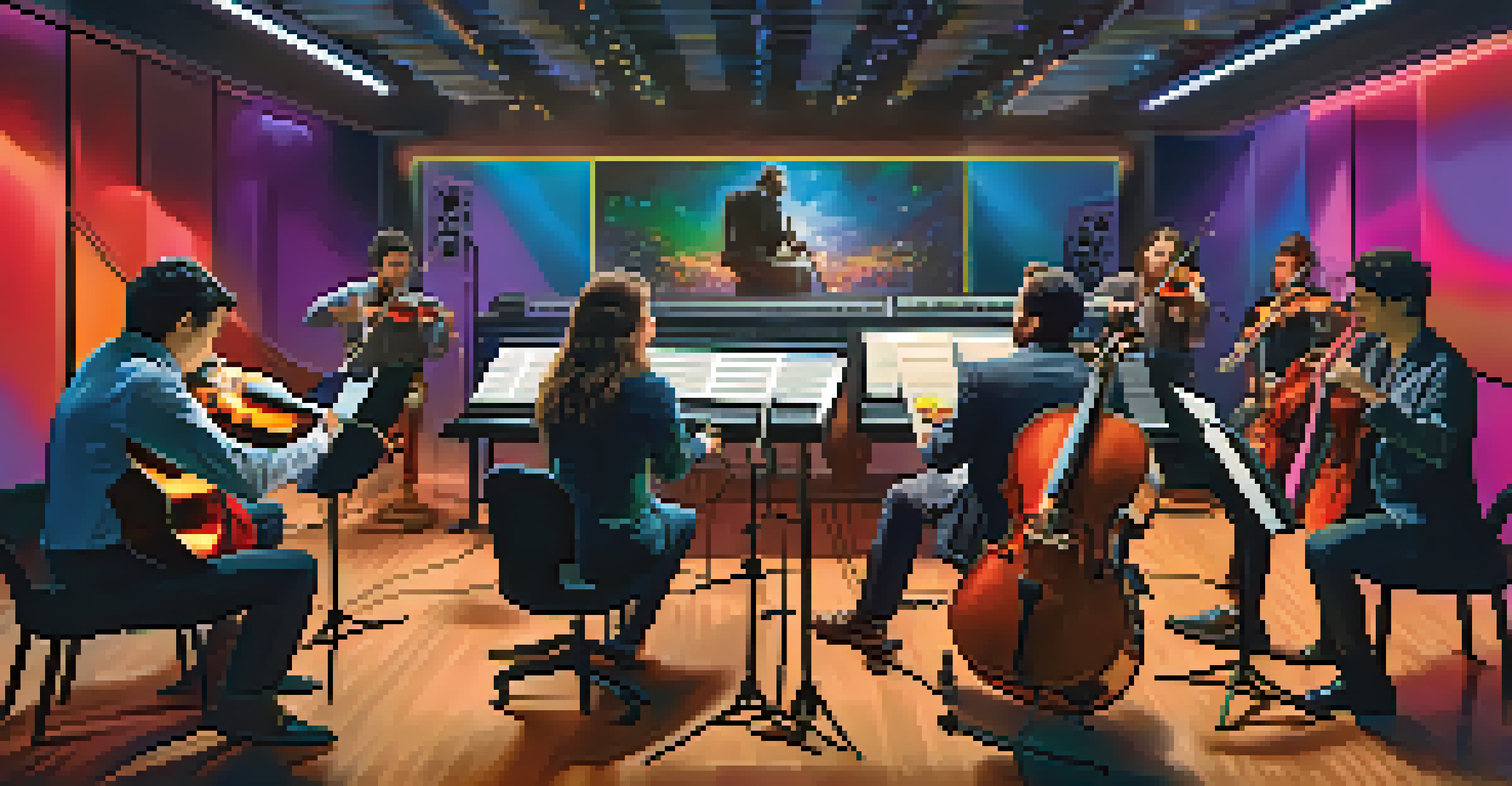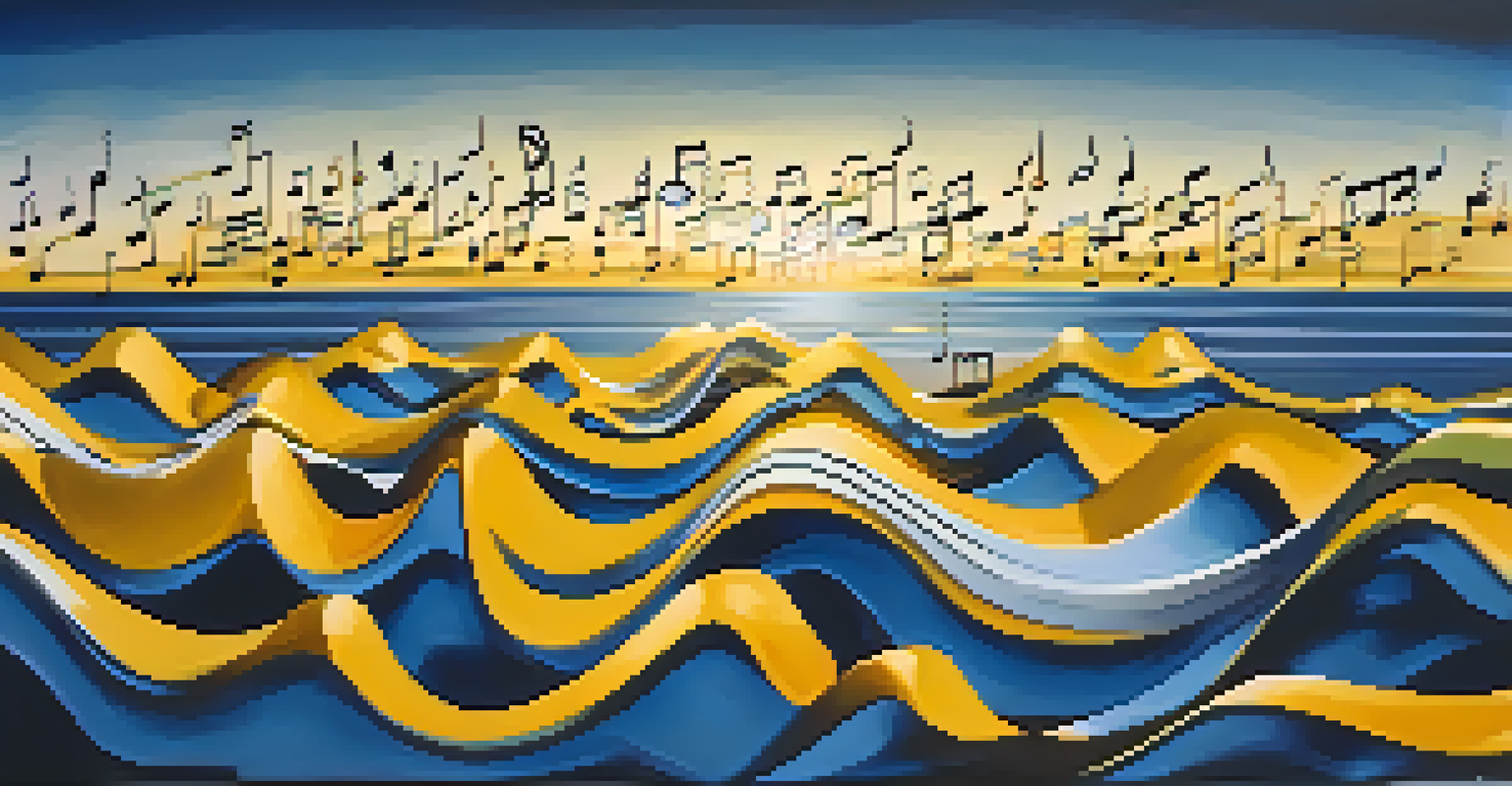Film Scores: The Unsung Heroes of Cinematic Storytelling

Understanding the Role of Film Scores in Movies
Film scores serve as the emotional backbone of a movie, guiding audience reactions and enhancing storytelling. They can evoke a range of feelings, from joy to suspense, subtly influencing how we perceive a scene. Think of a tense thriller; without its pulsating score, the heart-pounding moments would lose their impact and intensity.
Music can change the world because it can change people.
Scores are meticulously crafted to complement the visuals, creating a seamless blend of sound and image. This orchestration allows viewers to immerse themselves deeper into the narrative, making them feel as if they are part of the story. Consider iconic films like 'Jaws' or 'Star Wars,' where the music is almost as recognizable as the visuals themselves.
Ultimately, a film score is not just background noise; it's a character in its own right. It communicates emotions and themes that dialogue sometimes cannot, making it an essential element of cinematic storytelling. When done right, a film score becomes a lasting memory that stays with us long after the credits roll.
The Evolution of Film Scores Through the Decades
Film scoring has undergone significant transformations since the early days of cinema. Initially, silent films relied on live musicians to create an atmosphere, using improvised scores that varied from theater to theater. As technology advanced, composers began to craft original scores specifically designed for each film, marking the beginning of a new era.

The 1930s and 1940s saw the emergence of grand orchestral scores, with composers like Max Steiner and Erich Wolfgang Korngold elevating film music to new heights. Their work laid the foundation for the lush, emotive scores we associate with classic Hollywood films. These composers shaped the sound of cinema, creating themes that defined characters and stories.
Film Scores Shape Audience Emotions
Film scores serve as the emotional backbone of movies, guiding audience reactions and enhancing the storytelling experience.
In recent years, film scores have continued to evolve, incorporating diverse musical styles and technologies. From the electronic soundscapes of modern sci-fi films to the use of traditional instruments in historical dramas, today's composers blend various influences. This evolution keeps film scores fresh and relevant, ensuring they resonate with contemporary audiences.
Iconic Composers Who Shaped Film Music
Certain composers have left an indelible mark on the film industry, becoming synonymous with cinematic excellence. John Williams, for example, is renowned for his unforgettable themes in movies like 'E.T.,' 'Jurassic Park,' and the 'Harry Potter' series. His ability to weave intricate melodies with emotional depth has made him a household name.
The only thing better than singing is more singing.
Similarly, Hans Zimmer has redefined modern film scoring with his innovative approach and use of technology. His work on films like 'Inception' and 'The Dark Knight' showcases a blend of orchestral and electronic elements, creating immersive soundscapes that enhance the storytelling. Zimmer’s scores often become cultural phenomena, further highlighting the power of music in film.
These composers, along with others like Ennio Morricone and Danny Elfman, have not only shaped the sound of their respective films but have also influenced generations of musicians and filmmakers. Their legacies remind us of the profound impact a well-crafted score can have on the cinematic experience.
The Emotional Impact of Film Scores on Audiences
One of the most powerful aspects of film scores is their ability to evoke emotions, often without a single word being spoken. A haunting melody can bring tears to our eyes, while an upbeat theme can lift our spirits in an instant. This emotional connection is a testament to the skill of composers who understand how to tap into the human experience.
For example, the score of 'Titanic' by James Horner masterfully captures the epic romance and tragedy of the film. Its sweeping melodies and poignant themes resonate deeply, enhancing our connection to the characters and their journey. Similarly, the music in animated films often amplifies the emotional stakes, making scenes more impactful.
Icons of Film Scoring
Renowned composers like John Williams and Hans Zimmer have significantly shaped the sound of cinema, leaving a lasting impact on film music.
Ultimately, film scores allow us to process emotions on a deeper level. They create a shared experience, drawing audiences into the story and making them feel what the characters feel. This emotional synergy between visuals and music is what makes cinema such a powerful storytelling medium.
The Collaboration Between Directors and Composers
The relationship between directors and composers is a vital part of the filmmaking process. Directors often have a specific vision for their films and rely on composers to bring that vision to life through music. This collaboration can lead to groundbreaking scores that elevate the entire film, creating a cohesive narrative experience.
For instance, director Christopher Nolan frequently collaborates with composer Hans Zimmer, resulting in iconic scores for films like 'Inception' and 'Dunkirk.' Their partnership highlights how a shared understanding of storytelling can enhance the emotional depth of a film. Together, they create a synergy that resonates with audiences and leaves a lasting impression.
This collaboration is not limited to big-budget films; independent filmmakers also seek out composers who can help shape their stories. The right score can elevate a modest production, turning it into a memorable cinematic experience. By nurturing these relationships, filmmakers can ensure that their stories are told in the most impactful way possible.
The Role of Technology in Modern Film Scoring
Technology has transformed the way film scores are created, allowing composers to experiment with new sounds and techniques. Digital audio workstations (DAWs) have made it easier than ever to compose, edit, and produce music, enabling composers to work more efficiently and creatively. This evolution has opened doors for new talent and diverse musical styles in film.
With the rise of synthesizers and sampling, composers can now blend traditional orchestration with electronic elements. Films like 'Tron: Legacy' showcase this fusion, creating a unique auditory experience that complements the film's visuals. Technology not only enhances creativity but also allows for more intricate sound design, resulting in richer scores.
Technology Transforms Film Scoring
Advancements in technology have revolutionized film scoring, allowing composers to blend traditional and electronic elements and democratizing access to high-quality sound.
Additionally, advancements in recording technology have made it possible to record full orchestras remotely, giving composers access to high-quality sounds without the need for a large studio. This democratization of film scoring has allowed smaller productions to achieve a cinematic sound that was once exclusive to big-budget films, further expanding the horizons of film music.
The Future of Film Scores in Cinema
As the film industry continues to evolve, so too will the art of film scoring. Emerging trends suggest a greater emphasis on diversity and inclusivity in music, reflecting a broader range of cultural influences. This shift will likely lead to richer, more varied soundtracks that resonate with global audiences.
Moreover, as streaming services dominate the landscape, we may see a rise in innovative scoring techniques that cater to shorter formats and episodic storytelling. Composers will need to adapt their styles to fit the unique demands of series and standalone films, ensuring that each score aligns with the pacing and tone of the narrative.

Ultimately, the future of film scores will be shaped by the ongoing dialogue between technology, storytelling, and audience expectations. As filmmakers continue to explore new narratives and genres, the music that accompanies their stories will remain a crucial component, ensuring that film scores remain the unsung heroes of cinematic storytelling.